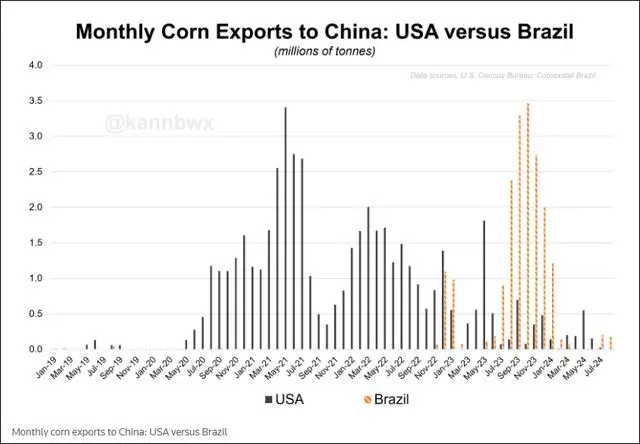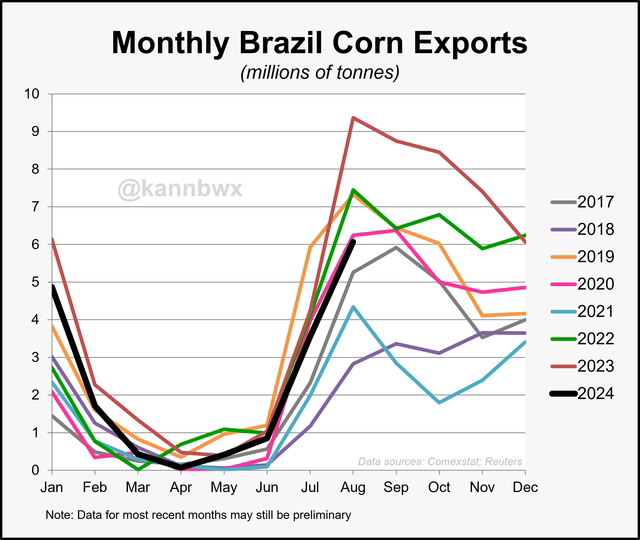Brazilian corn supply decreases, but Chinese buyers are still not interested in American corn
According to Reuters on September 18th, Brazil's corn harvest has decreased and exports have declined in recent months, but China, which has a huge demand for corn imports, has shown "almost no interest" in supplying corn to the United States. Data shows that in the 2023-2024 sales year, China's share of total US corn exports has significantly decreased from 31% three years ago to below 6%.
According to reports, China has been importing a large amount of corn since the end of 2020, with the United States being its main supplier. However, since the beginning of 2023, China has started importing Brazilian corn, resulting in a decrease in US corn shipments. Data shows that in the 2020-2021 sales year, 31% of US corn exports were sold to China, setting a historical record. But by the 2022-2023 sales year, this proportion will decrease to 18%. In the recently concluded sales year of 2023-2024, this proportion has dropped to below 6%. In contrast, less than 3% of Brazil's corn exports to China in 2022 surged to 29% in 2023.

Comparison of corn exports between Brazil (yellow line) and the United States (black line). Reuters chart shows that China's corn imports have decreased in recent months: 12.56 million tons of corn were imported in the first eight months of this year, a decrease of nearly 16% compared to the same period last year. Reuters believes that China's corn harvest has set a record for the fourth consecutive year, but this does not necessarily prevent strong imports from Chinese buyers: when global prices are low, foreign corn supply may be cheaper than domestic supply. The slowdown in China's corn imports is partly related to the decrease in Brazil's corn exports. Brazil's corn production for 2023-2024 has decreased by nearly 12% compared to the previous year. After setting an astonishing monthly record at the end of last year, Brazil's exports experienced a decline in the first half of 2024. In July and August, the first two months of Brazil's traditional shipping window, corn exports decreased by 29% year-on-year. This pattern will continue in the short term, as shipping companies suggest that Brazil's corn exports in September may decrease by nearly a quarter compared to last year.

At the same time, as the main competitor of Brazilian corn exports, the United States has seen an increase in corn production. The National Corn Association of the United States recently predicted that corn production in 2024-2025 will increase by 3.6% compared to the previous year. The United States is the world's second largest corn exporting country, with the combined corn exports from the United States and Brazil accounting for over half of the total global corn exports. In theory, the contraction of Brazilian corn supply and the increase in US corn harvest should increase opportunities for US exporters, "Reuters said. However, the US may have to pin its hopes on traditional corn customers such as Mexico and Japan, as Chinese buyers have not sought US corn to fill the gap and have shown" almost no interest "in US corn supply for 2024-2025. Reuters analysis believes that the geopolitical situation is the main reason for the sluggish export volume of corn from the United States to China, and agricultural trade between China and the United States has never flourished in the face of increasing diplomatic tensions. The upcoming US election in November is expected to further affect trade between the two countries. As the November US presidential election approaches, in order to gain political benefits, the Democratic government led by Biden has proposed to increase tariffs on China, with frequent actions targeting "target strategic products" such as electric vehicles, photovoltaics, and chips. At the same time, US officials began to stir up clich é s about China's "overcapacity" and "national security", and tried to persuade allies to jointly take trade measures with China. In early September, the US Department of Commerce announced again that it would further strengthen restrictions on the export of technologies such as quantum computing and semiconductor manufacturing. Regarding this, Chinese Foreign Ministry spokesperson Mao Ning pointed out that China has always opposed the politicization and weaponization of economic, trade, and technological issues by the United States. The Chinese side believes that artificially setting obstacles to normal technological cooperation and economic and trade exchanges violates the principles of market economy, disrupts the stability of the global supply chain, and is not in the interests of any party. Reuters mentioned that with the upcoming election, both parties in the United States frequently manipulate the "tariff" tool. The Biden administration recently confirmed that it will further increase tariffs on Chinese imported goods; Republican presidential candidate and former President Trump has repeatedly declared that he will impose high tariffs on all Chinese goods. Therefore, if another trade dispute is brewing, US corn exporters should not expect a return to the Chinese market


 Industry
Industry